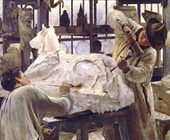 The idea of craftsmanship has long languished as the standard of quantity has prevailed. Products are more often judged by how many can be produced in a given time rather than the quality of the product and the excellence of the skills employed.
The idea of craftsmanship has long languished as the standard of quantity has prevailed. Products are more often judged by how many can be produced in a given time rather than the quality of the product and the excellence of the skills employed.
Sociologist Richard Weaver writes that it was the concept of perfect  execution of skills in production “that gave zest to labor and served to measure the degree of success. To the extent that the concept obtained, there was a teleology in work, since the laborer toiled not merely to win sustenance but to see this ideal embodied in his creation. Pride in craftsmanship is well explained by saying that to labor is to pray, for conscientious effort to realize an ideal is a kind of fidelity. The craftsman of old did not hurry, because the perfect takes no account of time and shoddy work is a reproach to character. But character itself is an expression of self-control, which does not come of taking the easiest way. (Richard M. Weaver, Ideas Have Consequences, Chicago: University of Chicago Press, 1984, p. 73.)
execution of skills in production “that gave zest to labor and served to measure the degree of success. To the extent that the concept obtained, there was a teleology in work, since the laborer toiled not merely to win sustenance but to see this ideal embodied in his creation. Pride in craftsmanship is well explained by saying that to labor is to pray, for conscientious effort to realize an ideal is a kind of fidelity. The craftsman of old did not hurry, because the perfect takes no account of time and shoddy work is a reproach to character. But character itself is an expression of self-control, which does not come of taking the easiest way. (Richard M. Weaver, Ideas Have Consequences, Chicago: University of Chicago Press, 1984, p. 73.)


